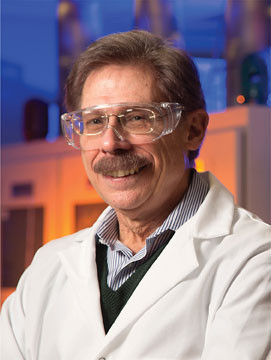William J. Koros, Ph.D.
Membrane Science and Technology
Georgia Institute of Technology
Recruited: 2001
Bill Koros designs synthetic membranes – filters that work on a molecular level to separate or purify gases.
Some of the membranes developed in his lab can derive pure oxygen or nitrogen from air. Others remove impurities from natural gas. Koros is striving for the day when synthetic membranes will filter exhaust from automobiles and industrial sources, keeping pollutants out of Earth’s air.
His team of chemical engineers conducts three primary types of research:
- First, they study the properties of advanced materials that can either filter or absorb specific molecules.
- Next, they design membranes – frequently using a hybrid of polymers and inorganic materials whose properties they have studied – to function as filters for a specific purpose.
- Finally, they develop methods to produce the membranes in the most economical ways possible.
Long-established as an expert in materials science, Koros continues to evolve his research using new technology. His current projects employ nano-scale engineering to create materials that can separate molecules with the most minuscule size differences – as small as 0.02 nanometers. Once designed at the tiniest level, the materials are translated to the macro scale using an advanced process called hollow fiber spinning.
Research
- High performance MOF/polymer composite membranes for carbon dioxide capture
- Formation of asymmetric polymer-alumino-phospate membranes
- Mixed matrix hollow fiber sorbents for gas separations
- Selective removal of large hydrophobic solutes
- Fundamentals of advanced barrier materials for beverage packaging
- Amino silane functionalized cellulose acetates for high performance sorbents and membranes
- Fundamentals of advanced barrier materials for packaging
- Membranes for heat integrated CO2 capture via sub-ambient temperature operation
- Removal of enzyme inhibitors from biomass hydrolysis solution
- Separation of butane isomer mixtures using dense mixed matrix membranes
- Ester crosslinked asymmetric hollow fibers for natural gas purification
- Engineering of asymmetric carbon hollow fibers for olefin-paraffin separation
- Carbon molecular sieve membranes for olefin-paraffin separations
- Hydrogen sulfide removal from natural gas streams using dense film membranes
- Decarboxylation-induced crosslinked polyimide hollow fiber for aggressive natural gas feed streams
- CO2 adsorption onto amino functionalized cellulose acetate fiber sorbents
- New solid sorption systems for CO2 capture
- Advanced membrane materials for N2/CH4 selective separations
- Mixed matrix membranes hollow fiber membranes for propane/propylene separations
- Carbon molecular sieve membranes for propylene ¨c propane separations
- Mixed matrix membrane materials for H2S removal from natural gas
- Hollow fiber membranes for H2S separations
- Delivery of CO2 for the enhancement of photosynthesis in algae-based biofuel production
Choosing Georgia
Koros saw a positive environment in Georgia, where leaders understand the role education and research can play in economic development.
Intellectual Property
22

